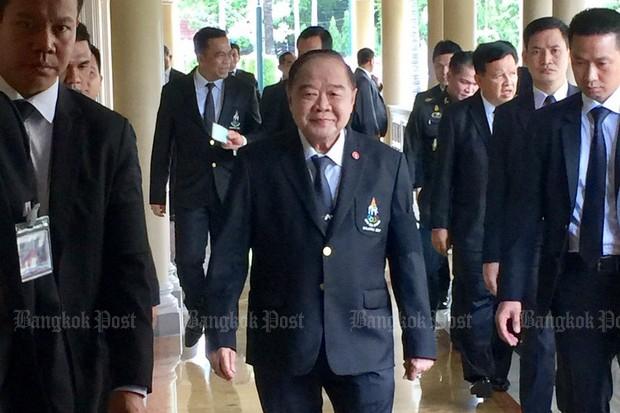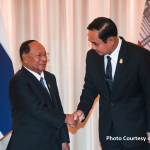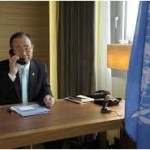
By Wassana Nanuam and Patpon Sabpaitoon for the Bangkok Post on 11 August 2017,
Prawit urges legal action against officials
A government-installed panel has rolled out an anti-human trafficking plan which corresponds with a United States recommendation given to Thailand in its latest Trafficking in Persons (TIP) report, authorities say.
The action plan was approved in a meeting of the Human Trafficking Prevention and Suppression Committee, chaired by Deputy Prime Minister Prawit Wongsuwon, at Government House Thursday.
The panel also approved the action plan, formulated from the suggestions outlined in the 2017 TIP report, and relevant agencies were told to stringently enforce it and produce tangible outcomes by December, defence spokesman Kongcheep Tantravanich said.
Gen Prawit stressed the current government attaches importance to efforts to prevent and suppress human trafficking, Maj Gen Kongcheep said.
Officials have been told to work with the civic sector to deal with the problem and all state agencies must give updates on their achievements every three months, he said.
He said Gen Prawit also asked all agencies to come up with tangible results, particularly proceeding with legal action against state officials involved in trafficking.
Efforts must also be made to follow up cases which have courted public attention, tackle graft, and boost the capability of officers in enforcing the laws as well as separating victims from illicit networks and protecting witnesses, Maj Gen Kongcheep said.
Efforts must be made to create better understanding about human trafficking and work with civic networks to deal with the matter, Maj Gen Kongcheep said, citing Gen Prawit.
The deputy premier stressed officials must not be involved with human-trafficking syndicates, he said, adding efforts must be made to ensure a sustainable solution to the problem.
At Thursday’s launch of a report on “Trafficking in Persons from Cambodia, Lao PDR and Myanmar to Thailand” by the United Nations Office on Drugs and Crime (UNODC) and the Thailand Institute of Justice (TIJ), researcher Deanna Davy said most irregular labour migration to Thailand from countries in the Mekong sub-region: Cambodia, Laos, Myanmar, occurs irregularly because of the high cost and slow process of entering legally.
The governments in the Mekong sub-region need to counteract human trafficking by deterring irregular migration, actively promoting safe migration by making the process legal, and eradicating overlapping fees, and cooperating with international governments at all levels, she said.
“We should aim to make migration transparent and legal and eliminate overlapping fees for workers aiming to come to work in Thailand,” TIJ executive director Kittipong Kittayarak said.
In Asia, lack of data and information is one of the biggest challenges in countering trafficking, the report said.
UNODC regional representative Jeremy Douglas said countries in the Mekong sub-region need to cooperate in sharing intelligence to identify the network and crack down on traffickers more effectively.
“We strongly recommend establishment of a regional task force focusing on the Mekong sub-region to share intelligence between countries much more quickly and actively, so that they can address the issue effectively,” he said.
Meanwhile, an Australian, a Syrian and two Thais have been arrested for allegedly luring a Moroccan woman into prostitution in Bangkok, according to the Department of Special Investigation (DSI).
The DSI officials said they received information from international organisations and the Alliance Anti Trafic (AAT), who said a Moroccan sought their help as the woman said she was forced to provide sex services.
She said she was brutally assaulted and had her passport taken, the officials said.
The woman said she was forced to provide sex services at an entertainment venue in a hotel in Nana Nua area of Klong Toey district, they said.
The DSI’s Anti-Human Trafficking Centre later expanded the probe and sought warrants for the arrest of five suspects — Michael Pearl, a 45-year-old Sudanese Australian; Ghassan Wakej, 36, from Syria; and two Thai nationals, Chalad Narachan, 62, and Aree Eiamsaree, 45, and an unidentified Moroccan woman who is still on the run.
On Tuesday, the centre was notified by Worawat Amornwiwat, deputy commander of the Special Branch’s Division 2, that officers arrested Mr Pearl at Suvarnabhumi airport.
Mr Wakej was also arrested later on the same day.
A search of hotel rooms where the two stayed revealed various other items of evidence, the officers said.
Meanwhile, the two Thai suspects reported to the DSI Thursday and officials opposed their bail requests. DSI chief Paisit Wongmuang said the probe will be widened.
Source: http://www.bangkokpost.com/news/general/1303843/govt-tackles-trafficking-head-on




